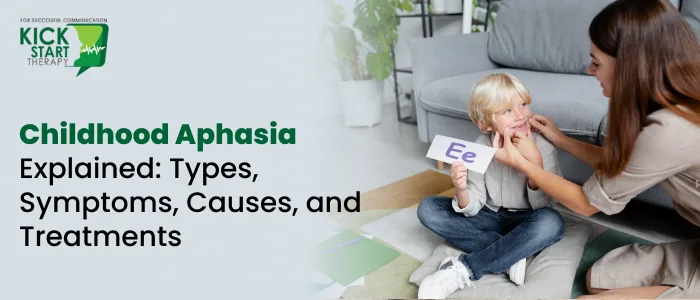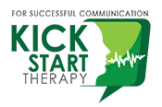
Aphasia is a neurological condition that affects a person’s ability to speak, understand language, read, or write. Although aphasia can occur at any age, it is more common among older adults over 65, especially after a stroke, traumatic brain injury, or brain tumor.
In recent years, Canada has seen a noticeable rise in childhood speech disorder cases. Around 20–30% of children who survive a stroke may experience aphasia. Unfortunately, many parents often confuse this language disorder with conditions like Asperger’s syndrome or Autism Spectrum Disorder. But it’s important to distinguish them so children can get the right diagnosis and support.
To help raise awareness and clear up common misconceptions, Seema Shah, Speech-Language Pathologist (SLP) at Kick Start Therapy, shares her insight to educate parents, caregivers, and the community. In this article, she explains what aphasia is, how it affects communication, the different types, symptoms to look out for, possible causes, treatment options, and when it is the right time to seek professional help.
What is Childhood Aphasia?
Childhood Aphasia is a language disorder that affects how the brain understands and uses words. It usually develops after a brain injury, stroke, infection, or a period when the brain didn’t get enough oxygen, often due to illness or trauma.
A child with aphasia may find it hard to speak in full sentences, remember the right words, or understand what others are saying. They might get frustrated because they know what they want to say, but can’t get the words out. This can lead to emotional stress or problems in school or with friends.
It is important to know that aphasia has nothing to do with a child’s intelligence. These kids are just as smart; they just need support in how they communicate. With early intervention, such as speech and language therapy, many kids with speech disorder improve a lot over time.
What are the Common Symptoms of Aphasia in Children?
As a speech-language pathologist, I often meet parents who come in late for a diagnosis, not because they ignored the problem, but simply because they did not know what signs to look for. Aphasia in children can be confusing, and since every child is different, it is not always easy to spot.
Here are the common signs of childhood aphasia:
- The child has trouble speaking clearly, often using incomplete sentences or speaking very slowly.
- Struggle to find the right words and may make up words or mix up sounds without realizing it.
- Find it hard to understand what others are saying, especially when sentences are long or complex.
- Shows difficulty with reading and writing, such as not recognizing simple words or spelling incorrectly.
- Have problems with short-term memory or staying focused, which makes language even harder.
- Become frustrated, anxious, or upset during conversations because they can’t express their needs or feelings.
- Has difficulty using or understanding numbers, telling time, or doing basic math.
- Hesitate while speaking, have a limited vocabulary, or use incorrect grammar.
- Struggles to follow instructions or retell simple stories or events.
- May also have weakness or partial paralysis on one side of the body, especially if the brain injury was severe.
What are the Different Types of Childhood Aphasia?
Aphasia can affect children in different ways, depending on which areas of the brain are impacted. While every child may show different symptoms, speech disorder is generally grouped into specific types based on how it affects speaking, understanding, reading, or writing. Here are the main types of aphasia:
Broca’s Aphasia (Expressive/Non-Fluent)
Children with Broca’s aphasia often understand what others are saying but struggle to speak themselves. They may speak in short, broken sentences and find it hard to form complete thoughts through words. Speech can be slow and effortful, and grammar may seem incorrect or missing.
Wernicke’s Aphasia (Receptive/Fluent)
In this type, speaking may sound smooth and fluent, but the words may not make sense. Children may use long sentences with made-up or incorrect words, and they often have difficulty understanding what others are saying to them.
Global Aphasia
This is the most severe form, where both speaking and understanding are heavily affected. Children may say very few words and have trouble recognizing even simple language. It usually occurs after a major brain injury or stroke.
Anomic Aphasia
Anomic aphasia mainly affects word recall. A child may understand language well and speak clearly, but struggle to find the right word when speaking or writing.
Primary Progressive Aphasia (PPA)
Although very rare in children, PPA is a condition where language skills gradually worsen over time. It affects both understanding and speaking abilities.
What is the Main Cause of Aphasia?
Aphasia is a language disorder that happens when certain parts of the brain are damaged, which makes it hard for a child to use or understand language. The most common reason is a change or injury in the brain’s language areas, especially the left side.
Here are the main causes of Aphasia Disorder:
Brain Stroke
In many cases, aphasia begins after a stroke. A stroke stops blood from reaching certain parts of the brain. When this happens, the brain cells in charge of language can get damaged. This damage makes it hard for the brain to send or receive words the right way.
Head Injuries or Accidents
Sometimes, aphasia happens after a fall or a serious accident. Even a single moment of impact can affect the brain’s ability to process speech and understanding. This is more common than people think in children.
Infections or Brain Tumors
Aphasia can also happen when something grows or spreads in the brain, like a tumor, or when there’s a serious infection. These can press on or harm the parts of the brain that manage communication.
Other Causes
In some rare cases, children may be born with conditions that affect how their brain develops, or they may have seizures that interrupt brain functions related to speech.
Is Aphasia a Genetic Disorder?
No, aphasia is not genetic, as it affects people after a stroke, head injury, or brain-related illness. These situations usually happen without any family link. In most cases, aphasia is not something people inherit from their parents.
Most aphasia cases are what doctors call sporadic, as they occur randomly, without any known family history. But there is one rare form, called Primary Progressive speech disorder (PPA), that sometimes shows up in families across generations.
In certain families, people with PPA may carry rare genetic changes, especially those linked to conditions like frontotemporal dementia. These changes do not happen often, but when they do, they might increase the chance of someone else in the family developing PPA too.
Not all types of PPA have the same risk. For example, Progressive Non-Fluent speech disorder tends to have a stronger genetic link than others, like Semantic Dementia.
Which is the Best Treatment for Aphasia?
The most effective and best treatment for aphasia is speech and language therapy (SLT). Trained speech and language pathologists (SLPs) slowly work with the child, using different exercises and tools to help them improve their communication skills.
They aim to make therapy more personalised, as what works well for one person might not work the same for someone else. That’s why the therapist first understands the child’s needs, strengths, and goals. For example, some might focus more on understanding words, while others may work more on speaking clearly.
In some cases, when speaking becomes too difficult, AAC (Augmentative and Alternative Communication) can offer another way to connect. This might include pointing to symbols, writing things down, using communication boards, or trying apps designed for easy interaction.
Family support also plays a significant role here. When they use simple words, speak slowly, and give the person time to respond, it creates a safe space to practice and build confidence.
In some cases, group therapy or support groups can help too. Meeting others who face the same challenges brings comfort and shared ideas.
Conclusion
Aphasia can be confusing, especially when it shows up in a child who’s still learning to express themselves. But knowing what it is, how it works, and the kinds of support that exist can bring a lot of clarity and comfort. Throughout this guide, SLP Seema Shah shared her insights to help make things clearer, breaking down complex terms into something more relatable and easier to understand.
If you are noticing signs of speech disorder in your child, KickStart Therapy can help through specialized speech and language therapy designed to meet your child’s unique needs. With a gentle, supportive approach, the therapists focus on helping each child communicate in ways that feel natural and comfortable to them.
FAQs
Can Someone Recover from Aphasia?
Yes, many people can improve with the right support. Recovery depends on the cause, type, and how early treatment begins. Some may fully recover, while others learn new ways to communicate. Regular support and speech therapy help a lot in making steady progress.
What is the Mildest Aphasia?
The mildest form is usually anomic aphasia. People with it can understand and speak fairly well, but often struggle to find the right words, especially names or specific objects. It is frustrating, but they can still hold conversations and be understood with a bit of patience.
Can You Have Aphasia Without Having a Stroke?
While stroke is the most common cause, aphasia can also happen after a head injury, brain tumor, infection, or other brain-related conditions. It is not only linked to strokes, but it can also result from anything that affects the language areas of the brain.
How Long do People with Aphasia Usually Live?
Aphasia itself doesn’t shorten life. How long someone lives depends more on the condition that caused it, like a stroke or brain injury. With proper care, many people with speech disorder live long, healthy lives and continue improving their communication skills.
Is Aphasia a Disability in Canada?
Yes, aphasia is recognized as a disability in Canada. People with speech disorder may be eligible for support services, therapy programs, and disability benefits. The goal is to help them lead as independent and supported a life as possible.
What is Anomic Aphasia?
Anomic aphasia is a type where a person knows what they want to say but can’t always find the right word, especially names or specific terms. They can understand others and speak in sentences, but often pause or struggle with word-finding.
At What Age Does Aphasia Start?
Aphasia can happen at any age if there is a brain injury or condition affecting language. It’s more common in adults, especially after strokes, but children can develop aphasia too, usually after a head injury or neurological issue.
Can ADHD Cause Aphasia?
No, ADHD does not cause aphasia. But both can affect communication in different ways. ADHD may cause trouble with focus and organizing thoughts, while speech disorder comes from brain damage and affects language itself. They are different conditions, but can sometimes seem similar.
Is Aphasia Linked to Autism?
Aphasia and autism are separate conditions. Autism affects social communication and behavior, while speech disorder affects language due to brain injury. However, some children with autism may also have language difficulties that might seem like speech disorder, but the causes are different.
Can Aphasia be Caused by Childhood Trauma?
Emotional trauma alone doesn’t cause aphasia. But extreme stress or trauma can lead to speech or communication changes that may look similar. speech disorder occurs due to physical damage to the brain, usually from injury, stroke, or neurological illness.
